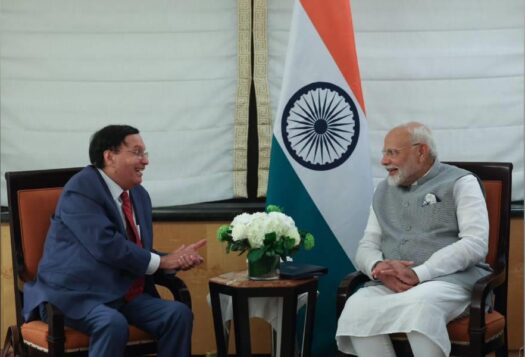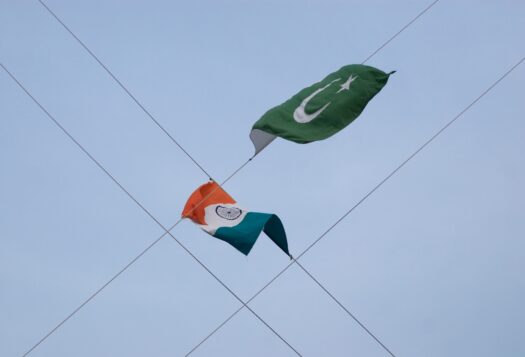
As India recommences its bid for entry into the Nuclear Suppliers Group (NSG), Pakistan has offered it a bilateral nuclear non-testing agreement. At first glance, this proposal might seem like a positive suggestion. However, deeper inspection suggests more interested motivations from Pakistan’s perspective, especially considering India already has a voluntary moratorium on nuclear tests and has expressed commitment toward a non-discriminatory and time-bound Comprehensive Nuclear-Test-Ban Treaty (CTBT).
There seems to be a two-fold motive behind Pakistan’s offer. The first is to undertake foundational work that would send positive signals to the Nuclear Suppliers Group about Islamabad’s professed non-proliferation credentials; the second is an attempt to malign India by highlighting its refusal to agree to Pakistan’s gesture, and to question India’s intentions towards nonproliferation objectives, including a voluntary moratorium on nuclear testing. However, Pakistan’s attempt to intermix its NSG prospects with that of India is fallacious.
Even ignoring Pakistan’s motivations, its proposition for a bilateral agreement on nuclear non-testing is not a feasible option for India. Unlike Pakistan, which has an India-centric nuclear weapons program, India’s nuclear strategy is more China-specific. China’s growing military and naval power, territorial assertion in the South China Sea, clandestine nuclear commerce with Pakistan, increasing naval logistic hubs in Pakistan, and existing border disputes with India keep New Delhi cautious about Beijing’s strategic ambitions. Most importantly, China has increased paramilitary deployment in Tibet and closer along the Indian border thereby bringing it within the firing range of China. Though these developments do not pose existential threats at present, they are potential sources of strategic concern that cannot be ignored by India. Given the complexities, it is detrimental to India’s interests to cap its strategic options prospects China and enter into a binding bilateral no-nuclear-testing agreement with Pakistan.
Pakistan had also offered such a bilateral arrangement on non-testing of nuclear weapons in the aftermath of the 1998 tests. The proposal was not acceptable to New Delhi even then given the security threats faced by India in the region. The clandestine China-Pakistan nuclear nexus coupled with Pakistan’s nuclear brinkmanship (firing of Ghauri missile in April 1998) had deeply imperiled India’s security interests. Two hostile nuclear neighbors (one overt and the other covert) pushed India to cross the nuclear rubicon in May 1998.
The existing stalemate makes any forward movement on confidence-building-measures (CBM) between India and Pakistan difficult. Post the 1998 tests, an attempt was made by India to effect a bilateral no-first-use (NFU) policy with Pakistan which strategically restrained both the nuclear-capable states without ignoring their existing security imperatives. It is also important to note that Pakistan too has turned down bilateral motions proposed by India to improve nuclear stability in South Asia, particularly in the area of no first use. After the May 1998 tests, Prime Minister A.B. Vajpayee, in the official paper entitled Evolution of India’s Nuclear Policy, expressed India’s “readiness to discuss an NFU agreement [with Pakistan] as also with other countries, bilaterally, or in a collective forum.” This proposal was reiterated again in August 1998 when India announced that it “will not be the first to use nuclear weapons.” In January 2003, the Cabinet Committee on Security reviewed the progress in operationalizing India’s nuclear doctrine and re-emphasized a posture of NFU thereby underscoring that India would only use nuclear weapons for retaliation. However, Pakistan has consistently refrained from mutually reciprocating India’s proposal and retains a first-use posture.

Can there be a solution? Possibly, yes. NFU is an important CBM that can significantly contribute to strategic stability and ensure restraint and avoidance of an arms race in South Asia. An NFU policy would allow space for rational thinking during times of crisis, the reduction of brinkmanship, and the relaxation of higher-alert command and control structures, which would reduce the risks of nuclear accidents or unauthorized launches. As evident from India’s case, the NFU calls for a recessed deterrence posture by keeping nuclear arsenal de-mated and de-alerted. These enormously reduce salience on nuclear weapons, mitigate risks of nuclear terrorism, and strive for regional strategic stability. Apart from the mutual and regional strategic benefits, a bilateral NFU policy would ultimately be an assertion to the international community of the nuclear weapon status of India and Pakistan. The international community will welcome a bilateral NFU arrangement between the two nuclear neighbours that would invariably be tantamount to recognition of the nuclear weapon capabilities of India and Pakistan.
Will India’s NFU proposal be acceptable to Pakistan? Surprisingly, in November 2008, former President Asif Ali Zardari, speaking to an Indian audience, proposed a “no first nuclear strike” policy with India. However, the Pakistan Army quickly rebuffed him. Pakistan has maintained its need for a first use policy because it gives Pakistan the flexibility of forward deployment of tactical nuclear weapons to counter India’s conventional superiority in a crisis situation. However, between the forward deployment of nukes and their actual usage in a battlefield scenario, Pakistan would have to undertake a cost-benefit analysis keeping in mind bilateral stability and its own survival. Despite the military advantages first use provides Pakistan from a deterrence perspective, it is ultimately in Pakistan’s best interests to have a NFU policy because a symmetric nuclear posture would ensure sustainable strategic stability. It can be ascertained with a degree of presumption that Pakistan will exercise rational decision and not indulge in any nuclear misadventure. This was evident from the conduct of a nuclear war game between India and Pakistan in which the author was the political advisor from the Indian side. Contrarily, if Pakistan abandons a belligerent nuclear policy towards India and accepts India’s NFU proposal, it will display strategic pragmatism as is evident from nuclear dyads of Russia and China as also between China and India.
Russia and China have a bilateral NFU agreement irrespective of their strategic complexities vis-a-vis the US. There is a general understanding that the United States won’t be the first one in a conflict to use nuclear weapons. This perceived understanding provides strategic space between conflicting nuclear nations like Beijing and Moscow to commit to a NFU policy. Similarly, in the regional context, China has a NFU policy and the prospect for a high nuclear threshold is further assured with India’s declared policy not to use nuclear weapons first in a conflict. The double assurance should be an incentive for Pakistan to abandon first-use posture and adopt a NFU policy. Any such bilateral confidence building measure holds potential for enhanced nuclear cooperation as is evident from competing and conflicting nuclear nations of the United States and China. Despite strategic differences, both Washington and Beijing have taken concrete steps to communicate, cooperate, and collaborate on strengthening nuclear security.
Pakistan must cooperate with India in implementing a bilateral NFU policy in South Asia. Though a tall order, China must also take the lead in effecting a regional NFU policy in the greater interests of nuclear nonproliferation and regional nuclear disarmament.
***
Image 1: Koshy Koshy, Flickr
Image 2: Jay Mandal, Getty


